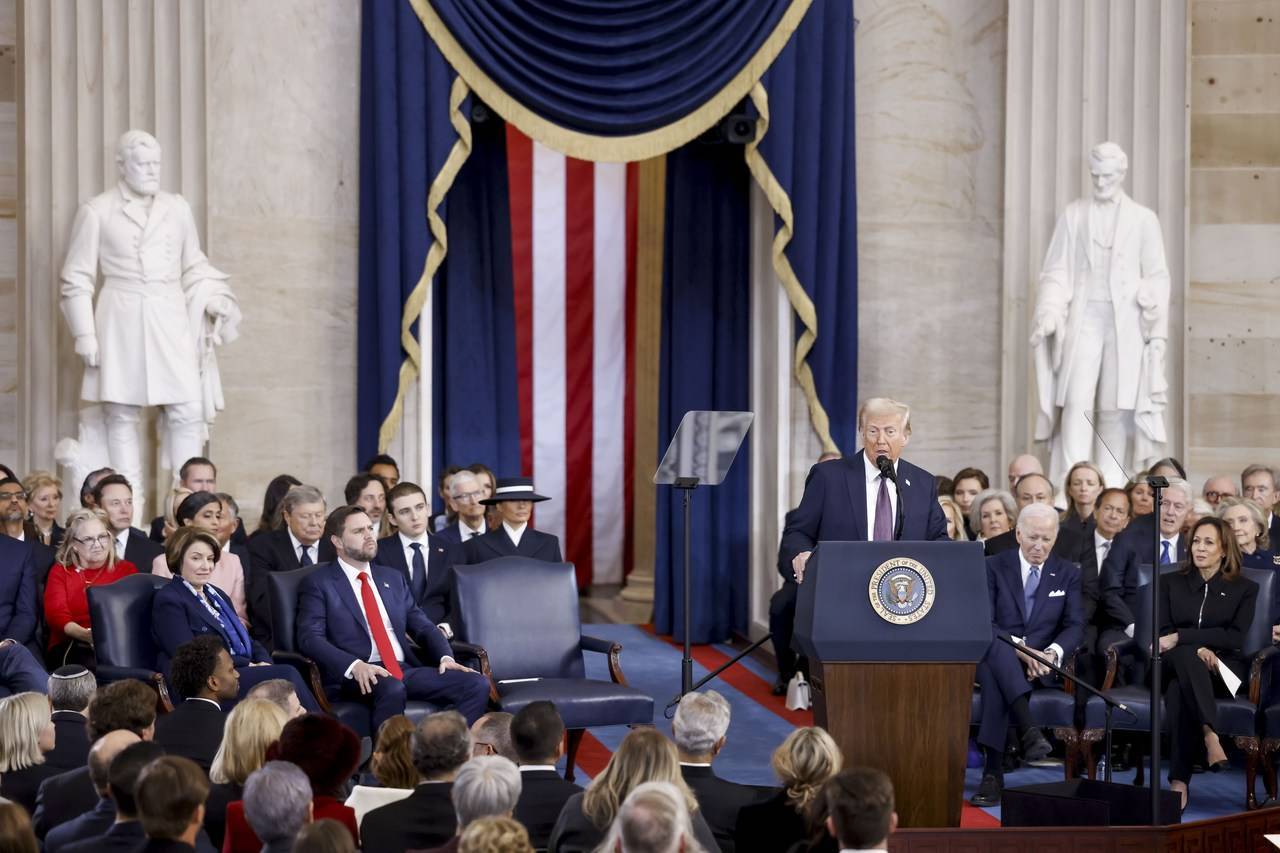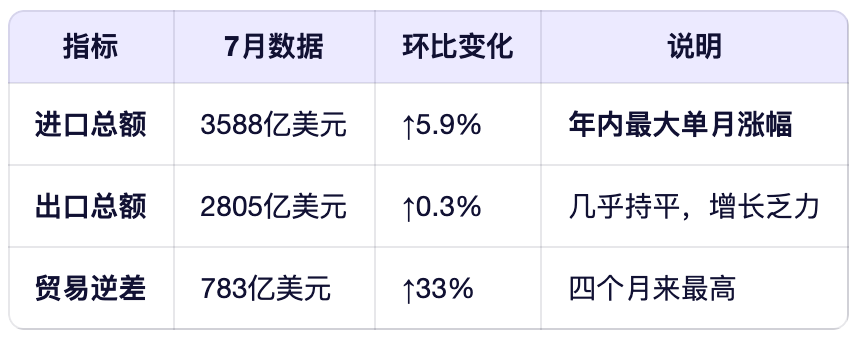
This week, the US tariff policy suddenly "changed its face".
In the latest news, Trump announced that he will exempt key metals such as graphite, tungsten, uranium, and gold bars from the list of global tariffs. But at the same time, silicon products are newly included in the tax list. The changes will take effect on Monday.
This wave of operations has a lot of impact. According to data just released by the U.S. Department of Commerce, the U.S. trade deficit (that is, the amount of money spent on imports than exports) jumped to $78.3 billion in July, a sharp increase of 33% from June!
Why is it rising so fast? The main reason is that enterprises "rush" to stock up. Because the United States previously imposed tariffs of up to 39% on Swiss goods, companies rushed to import industrial goods, especially gold, before the policy tightened - gold imports soared to $10.5 billion in July, a record high.
A seemingly technical adjustment has caused a lot of waves in the market.
|Trump tariffs "precise control"
The U.S. tariff adjustment involves a wider range than imagined, not only metals, but also affects many key fields such as high-tech, medicine, and food.
In addition to the previously mentioned strategic minerals such as graphite, tungsten, uranium, and gold bars that are exempt from tax increases, some commodities that the United States itself "cannot grow or produce" are also expected to be "loosened", such as specialty coffee, rare spices, and some rare metals.
The exemption of gold bars is of particular interest. A few weeks ago, U.S. Customs suddenly announced that it would impose taxes on imported gold bars, catching many traders off guard and causing chaos in the market. After all, Switzerland is an important source of gold in the United States, but because it has not signed a trade agreement with the United States, gold once faced tariffs of up to 39%. Now that it is clearly exempted, it can be regarded as a reassurance to the market.
Not only gold, but also "high-tech lifeline" materials such as graphite and tungsten have also been released. They are widely used in aircraft, mobile phones, medical equipment, military industry and other fields, and the exemption from tariffs can help reduce costs in related industries.
There are also new moves in medicine: generic drugs such as antibiotics have also received tariff reductions. Interestingly, these drugs themselves are still in another trade investigation, indicating that policies are also "walking and watching".
More importantly, this adjustment also brings about a "mechanism upgrade": in the future, the USTR and the Department of Commerce are authorized to directly implement trade framework agreements with other countries (such as those signed with the European Union, Japan, and South Korea) without waiting for the president to personally give orders.
This means that the implementation of tariff preferences will be faster and more flexible in the future, and will no longer be "stuck" in the hands of the president alone.
To put it simply, this adjustment is not only an "emergency", alleviating the hoarding of enterprises and stabilizing the supply of key materials, but also a "speed-up". Making trade execution more efficient may seem like a small change in tariffs, but in fact it affects the nerves of the entire U.S. economy.
The trade deficit soared to 78.3 billion yuan in July: not "out of control", but "rushing"
The latest data shows that the US trade "ledger" in July is not very good-looking.
The trade deficit (imports minus exports) widened to $78.3 billion, a 33% increase from June, the highest level in the past four months, and slightly higher than market expectations of $78 billion. Specifically: imports: rose sharply, reaching $358.8 billion, an increase of 5.9% in a single month, the largest increase this year; Exports: slightly increased by 0.3% to $280.5 billion, almost unchanged.

Why did imports suddenly skyrocket? The main reason is that enterprises are "rushing to stock up".
As the market expects the Trump administration to impose new tariffs on many countries around the world (especially a 39% tax increase on Swiss goods), companies are desperately importing raw materials and commodities before the policy is implemented to "prepare food" in advance.
The most exaggerated is gold - gold imports soared to $10.5 billion in July, a record high. In addition, imports of consumer goods and industrial equipment (excluding automobiles) also rose across the board.
To put it simply: everyone is worried that things will be more expensive in the future, so they simply buy enough now. This "rush" behavior directly pushed up imports and pushed the trade deficit to a high level.
Analysts believe that this wave of deficit expansion is not due to the sudden strengthening of US demand, but the early reaction of enterprises to the upcoming tax increase. In other words, it is not that the economy is really hot, but the short-term impulse brought about by "fear of price increases".
US PMI has shrunk for six consecutive months
The life of the U.S. manufacturing industry has become more and more difficult lately.
The latest survey showed that the US manufacturing purchasing managers' index (PMI) edged up to 48.7 in August from 48.0 in July. Don't look at the number up, but it has been below the "boom and bust line" of 50 for six consecutive months - which means that the U.S. manufacturing industry has shrunk for half a year.
What is even more worrying is that many factory owners report that the current operating environment is worse than it was during the Great Recession of 2007-2009. They generally pointed the finger at the Trump administration's tariff policy, complaining: "It's getting harder and harder to make things in the United States." ”
This pressure is also reflected in investment. According to the data, investment in U.S. factory construction fell by 6.7% year-on-year in July, indicating that enterprises' confidence in the manufacturing industry is cooling and they are unwilling to invest heavily in building factories.
Tariffs were intended to protect American manufacturing, but as a result, American factories "pitted their own people", with high costs and chaotic expectations, making it more and more difficult for the manufacturing industry.
Tariff adjustment is not "relaxation", but "more precise control"
Many people think that exempting gold is a "tariff ebb tide", but Jingtai believes that this just shows that Trump's tariff strategy is escalating - from a "comprehensive strike" to a "precise regulation".
His logic is clear:
Protect critical resources: ensure the security of the U.S. supply chain in AI, new energy, national defense and other fields; Intermediate products: use silicon and other materials to block the industrial chain links that rely on Made in China; Create uncertainty: Enterprises have to stock up in advance, transfer production capacity, and promote "friend-shore outsourcing" in disguise.
This adjustment seems to be "loosened", but in fact it is "more ruthless" - it uses exemptions to appease the market, tax increases to create pressure, and uncertainty to force enterprises to "choose sides".
Investment advice: opportunities and risks must be seen clearly
1. Positive: critical minerals and gold industry chain
Gold: Exemption from taxation = reduced import costs = good for US gold traders, ETFs, jewelers; Graphite, tungsten, uranium: Relevant mining companies and battery material manufacturers (such as anode material companies) will benefit from stable supply expectations.
Recommended attention: Gold ETF (GLD), Barrick Gold (GOLD); Uranium mining stocks (Cameco, Uranium Energy).
2. Bearish: Midstream manufacturing companies that rely on silicon materials
The cost of photovoltaic, semiconductor packaging, medical devices and other industries will rise; In particular, enterprises importing silicone glue and silicone resin from China are facing direct impact.
Risk warning: Short-term may cause fluctuations in related U.S. industrial stocks; Pay attention to whether the enterprise has the ability to "localize substitution".





